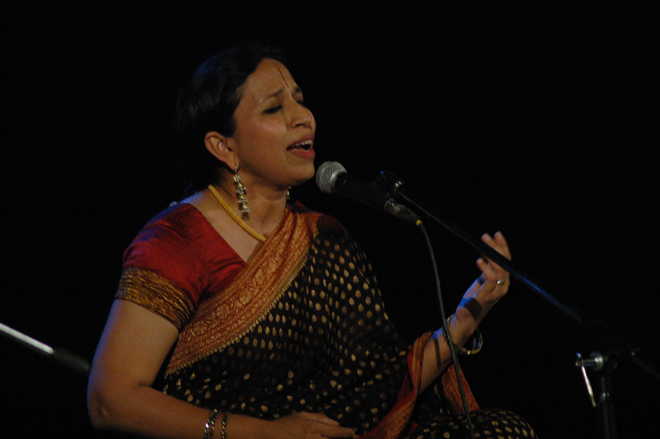
Chronicler: Vidya Shah
Vandana Shukla
The presence of Gauhar Jan, India’s first recording megastar, at a Congress session was objected to by ‘respectable ladies’ and the singer was asked to stay away. Yet, the gaanewali continued to raise money for the party. Piqued that Mahatma Gandhi did not show up for one of her fundraising events, she once donated only half of what she had promised. Kirana gharana maestro Gangubai Hangal also describes being at the receiving end of hypocrisy of the elite. “I remember singing for the Belgaum Congress session (1924) attended by Gandhiji, my only paranoia throughout the programme was that I would be asked to eat my food separately,” she said.
The trailblazers of today’s mega entertainment industry had to face contempt of the social reformers too. Irrespective of the fact, the female artistes known as baijis, tawaifs or ‘those woman’ conserved the rich musical heritage of India for posterity. They pioneered recording of music for the Gramophone Company from the early 20th century when pundits and ustads backed out, fearing loss of voice and that records would make their art common, and, well, accessible to all.
An ignored lot
The unsung women artistes were risk takers and innovators. They proved to be enterprising and audacious. Except respectability, the first among the liberated women of India had everything. Ironically, the founders of India’s recording industry were deliberately overlooked by the historians of music because of the social embarrassment they felt for their ilk.
Now, vocalist and researcher Vidya Shah has put them back on record after her decade-long extensive research. Her quest for this forgotten chapter of history began when after one of her concerts at IIC, Delhi, a music lover gave her a cassette and said, “Inhe bhi suniye.”
She realised that the music and compositions that the contemporary singers like her perform with a sense of entitlement were handed down by unsung divas like Zohra Bai Agrewali, Kitty Jan, Umda Jan, Mumtaz Jan and Kamla Jharia, whose names were scribbled on the cassette. The list of names and their priceless recordings and interesting narratives expanded as more and more connoisseurs, collectors and old restaurant and club owners contributed to build her rich repertoire that would have vanished without the names of the glorious singers who made evolution of music possible after the advent of technology.
Trade centres and music
Most of the first gramophone singers came from Varanasi, Kolkata, Kanpur, Lahore, Delhi — all trade centres with rich patrons. Vidya collected music from these sources and Parthiv Shah, her husband, photographed the old baris and jalsaghars where the singers were invited to perform. Together they put up Women on Record, an exhibition showcased at Jawahar Kala Kendra, Jaipur, during the Navras Festival in March. Vidya also performed these forgotten compositions for the audience.
From the 17th century, when khayal gayaki was at its zenith, it was the combination of baijis and baris that promoted khayal to glory and helped it flourish with refined artistry and ornamentation of the genre. Sadly enough, their great artistry remained devoid of social recognition.
Enter the gramophone
In the late 19th century and early 20th century, several British officers wrote about these disdained women, but soon realised their commercial value, which was exploited when Gramophone Company came to India.
In 1902, the first commercial recording was done by Gauhar Jan, who took the challenge of compressing an hour-long rendering of khayal into three minutes, for which she was paid Rs 3,000. Fred Gaisberg, the sound engineer from Gramophone Company who did the job unwillingly, found the singers shriek. They sounded so because they had to raise their pitch to enable embedding of the voice on the 78 RMP wax discs. It changed the way music would be heard in future; it also challenged the guru-shishya parampara. The pundits wrote books on music while the baijis modified, innovated and popularised it. Gramophone mehfils replaced real mehfils. Music was not just for the nobility anymore.
The first gramophone tour was held between 1908 and 1915. It established future trends for the entertainment industry. There were riddles, advertisements and other promotional events around these tours. The image of Saraswati could be found on some ads, with writing in Urdu script.
The entrepreneurs
The singers were highly accomplished women. Gauhar Jan, for instance, was also a trained kathak dancer and worked for advertisements. Sundra Bai Punewali wrote beautiful ghazals and composed music. Janaki Bai became a star and negotiated with music companies to have contracts. Anjani Bai Malpekar, who hailed from a family of professional female musicians, formed an association with other musicians to transform the status of gockarins and kalavantins (singers and dancers) in Goa, and refused to wear a special dress given to dancers to perform in weddings that differentiated them from the other women.
As sound was introduced to films, these women had one more opportunity to grow. The first music director of Bombay Talkies, Saraswati Devi (1912-1980), also gave playback for her film Jawani Ki Hawa (1935). Jaddan Bai, mother of famous actress Nargis, too was a music director. From a gramophone singer, she later became an actress. Kananbala, another actor-singer, had a banner of her own called Shrimati Films.



























